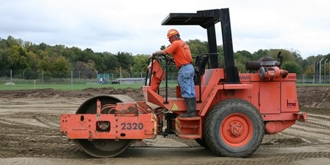Business Lancaster Trenching - Trenching Services for Organizations in Lancaster
Business Lancaster Trenching - Trenching Services for Organizations in Lancaster
Blog Article
Comprehensive Excavation Approaches: Understanding the Fundamentals for Success
In the realm of construction and civil design, the value of effective excavation strategies can not be overemphasized. The cautious preparation, accurate execution, and careful focus to information required in excavation jobs demand an extensive strategy that encompasses different basic aspects. From initial dirt evaluation to the implementation of safety and security measures and routine progression monitoring, grasping these core components is essential for attaining success in any type of excavation endeavor. Nevertheless, truth proficiency lies not just in understanding these principles but in perfectly integrating them to navigate the complexities of excavation projects with finesse.
Understanding Excavation Task Preparation

Effective excavation projects are built on the structure of thorough and extensive planning. The first phase of any type of excavation task is the preparation stage, where critical choices are made that can considerably affect the outcome of the task. During this phase, it is necessary to collect all appropriate information regarding the website, consisting of topographical surveys, dirt make-up, and any prospective hazards that might exist. Understanding the job scope, budget plan, and timeline restraints is important for producing a thorough excavation plan that ensures the job's success.
One secret facet of excavation project preparation is the growth of an in-depth timeline that details the series of target dates, activities, and landmarks. By very carefully thinking about all these elements throughout the planning phase, excavation projects can be implemented efficiently and efficiently, leading to effective end results - septic ohio.
Soil Evaluation and Site Examination
Conducting extensive dirt analysis and site evaluation is a crucial step in the prep work stage of any excavation task. Dirt analysis includes determining the structure, structure, and residential or commercial properties of the dirt at the excavation site. This details is essential for comprehending the soil's bearing ability, moisture web content, and possibility for erosion, which are essential consider figuring out the excavation approaches and devices required for the task.
Site examination surpasses soil analysis and encompasses a more comprehensive evaluation of the general website problems. This analysis includes determining any possible dangers, such as below ground utilities, environmental worries, or unpredictable terrain, that could influence the excavation procedure. By extensively reviewing the website, job supervisors can establish efficient excavation methods that focus on safety and security, efficiency, and ecological defense.
Using innovative modern technologies like ground-penetrating radar, dirt tasting, and drone surveys can boost the precision and effectiveness of dirt evaluation and website analysis. Investing time and sources in these initial actions can ultimately conserve time and prevent pricey hold-ups or complications throughout the excavation procedure.
Devices Selection and Usage
Effective excavation tasks depend heavily on tactical devices selection and use to make certain optimal performance and efficiency. Picking the best devices for the job is vital in optimizing efficiency and reducing downtime. Variables such as the sort of dirt, depth of excavation, and job extent go to this website play a substantial role in figuring out the most ideal devices for the job handy.

In addition to choosing the appropriate tools, correct use is crucial to task success. Operators should be educated to take care of the devices safely and efficiently - excavating ohio. Routine upkeep checks and timely repair services aid prevent failures and make certain constant performance throughout the job
Precaution and Rules Compliance
In the realm of excavation jobs, prioritizing precaution and conformity with guidelines is vital to guaranteeing a legitimately audio and protected functional setting. Precaution incorporate a series of practices, consisting of performing complete site analyses, executing appropriate signage and barriers, and providing sufficient security training for all workers associated click here for info with the excavation process. Adherence to laws, such as OSHA demands in the USA, guarantees that the excavation project meets the required standards to protect employees, bystanders, and the surrounding setting.

Surveillance Progress and Adjusting Strategies
Just how can predict managers properly track the advancement of excavation jobs and adapt their strategies appropriately to maximize end results? Monitoring progression is vital for making sure that excavation projects remain on track and satisfy due dates. Task managers can utilize different tools and strategies to track development, such as daily progress records, normal site examinations, and advanced tracking technologies like drones and general practitioners tracking systems. By continuously monitoring the project's development, managers can recognize any prospective hold-ups or problems early and take aggressive procedures to address them.

Verdict
In final thought, understanding the principles of extensive excavation methods is essential for the success of any type of project. By comprehending task planning, examining dirt and site conditions, picking appropriate equipment, following safety guidelines, and keeping track of development, project supervisors can guarantee a smooth and efficient excavation procedure. Implementing these techniques will certainly bring about effective results and minimize possible dangers or setbacks throughout the excavation project.
The first phase of any type of excavation project is the preparation stage, where essential choices are made that can substantially impact the end result of the task. Recognizing the job timeline, budget, and extent constraints is critical for creating a comprehensive excavation plan that ensures the job's success.
Just how can predict managers effectively track the innovation of excavation jobs and adjust their internet approaches accordingly to optimize end results? By carefully monitoring progress and being ready to adjust techniques, job supervisors can improve the overall success of excavation projects.
By recognizing project planning, assessing dirt and site conditions, picking appropriate devices, conforming with safety and security guidelines, and keeping an eye on development, project supervisors can make certain a smooth and reliable excavation procedure.
Report this page